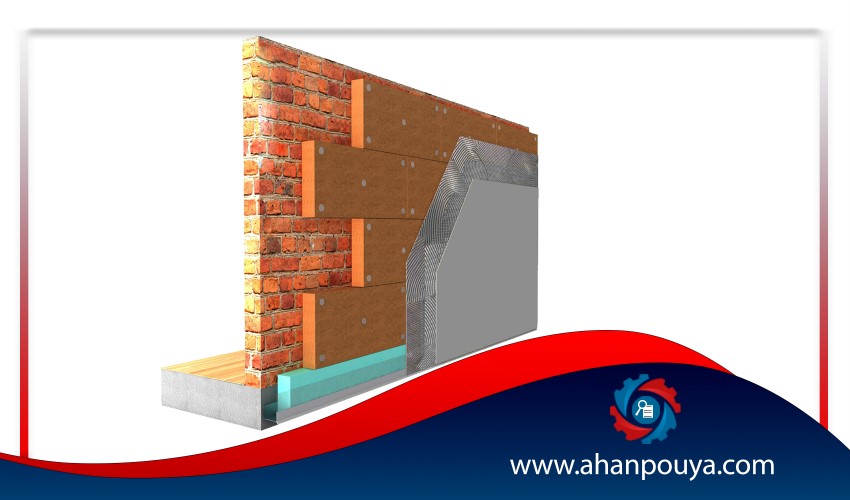
Due to the progress of humanity and the progress of construction , a variety of construction materials have entered the building market which is one of the most applied thermal insulation .
Anything that prevents the passage of mass and energy is called insulation. Since in today's constructions the walls have become relatively thin and the structures have become light structures.Heat transfer from the outside , as well as inside , is greatly increased . For this purpose , we use thermal insulation in buildings to prevent this loss of energy .
Thermal insulation is a tool that prevents the internal heat of buildings from being transferred to the outside in cold areas And it prevents wastage and prevents energy and heat loss. Also , heat insulation in the tropics also causes the heat to penetrate into the porous zone .
Thermal insulation is also used in industrial systems to control overheating or heat loss in pipes and process equipment, steam and liquid distribution systems, and boilers. thermal insulation reduces the cost of building materials . However, building insulation increases the cost of building construction.
1.Thermal insulation of fiberglass :
Fiberglass is a type of mineral fiber that sort of thermal insulation. This insulation is made of recycled glass material with some ordinary sand and resin. . The equilibrium temperature for fiberglass, depending on its use, is from minus one hundred and ninety-five degrees Celsius to one hundred and twenty degrees Celsius. But in special applications, the temperature range of fiberglass also reaches 450 degrees Celsius. Fiberglass, like other thermal insulators, can withstand temperatures up to one temperature. The tolerance temperature of fiberglass is 550 degrees. The important point is that fiberglass has no role in the progress of the fire. Also , greenhouse gases are not produced during fire .
2.Cellulose thermal insulation :
this type of insulation is made of paper , raw materials , slow cleaners , and other additives . Research has shown that cellulosic insulation protects buildings better than fiberglass insulation. because the insulation density of cellulose is higher than the insulation density of glass wool. this causes the oxygen needed to burn different parts of the building . cellulose dampers are highly environmentally friendly And cause minimal damage to the environment. The unique feature of these insulators is that due to their high density and thickness of 2.5 mm, they can be used optimally in limited and small spaces.
3.Polyurethane :
Polyurethane foam is a type of thermal insulation that is currently one of the most widely used insulations in the country. This insulation is composed of a combination of two materials, liquid isocyanate and liquid polyol. when the two substances are combined together Due to chemical interactions, it forms a solid substance called foam. These types of insulation are permanent insulators for us Which do not suffer from deformation and damage.
4.Polystyrene thermal insulation :
the thermal insulation of polystyrene or styrene is one of the best thermal insulation in the market . this type of insulation is very suitable for building floors and building walls .these insulation are made in various thicknesses and have different applications in or out of the building . These insulators are available in two general types, expanded and extruded. Polystyrene insulation is made of polystyrene or styrene polymers.
5.Plastic insulation :
Plastic thermal insulation includes several types of compressed plastics and in fact has a great variety and number, such as : polyethylene, phenolic, polyurethane, elastomeric insulation and.
6.Roll elastomeric insulation with aluminum coating :
use of this insulation in indoor environments does not require a finish but it should be used in foreign applications .The use of elastomeric insulation with aluminum coating is recommended due to its resistance to mechanical shocks and weather conditions.
7.Stone wool insulation :
Rock wool is the most common and healthiest thermal insulation and the origin of that igneous rock . This kind of insulation is simple and easy to use . have a fairly light weight and they cannot be destroyed by dampness. Because they retain their properties after drying This insulation is ineffective against water vapor and the advantages of this insulation. Because moisture in new buildings easily passes through the insulation in the form of water vapor and cools the building. The remarkable thing about this insulation is that it is compatible with all construction materials . The use of rock wool insulation as a fire retardant is one of its most important applications.
In fact, this insulation is used to protect metal structures, electrical installations, escape corridors, elevator shafts, etc. against fire. Rock wool is an open cell insulation, so it is affected by water and steam, and after installation, a layer of vapor barrier should be placed on it.
1.pushing resistance
2.thermal resistance
3.Combustibility
4.Wrinkles
5.Degree of toxicity
6.UV resistance
7.Resistance to fungi and germs
8.Capillary properties and density
9.Expansion and contraction coefficient
10.Chemically neutral (to prevent damage to surrounding metals)
light seeds
Cotton
Plastic materials
Fiberboard
Mineral fibers
Rock wool
Wood wool
glass wool
Hollow stems
Pressed cork
paper and aluminium
Lightweight gypsum boards with simple aluminum coating
Lightweight concrete (aerated concrete and floor concrete)
insulation prices depend on the type of application . The insulation thickness depends on its operating temperature . Also, the number of layers, the size of the pipe or the place where we want to insulate do not have an effect on increasing or decreasing the price of thermal insulation. The criterion for calculating the cost of insulation is based on "square meters" and it can be estimated by calculating the desired area.

Ahan Pouya with more than a decade of best-selling experience, adheres to professional and ethical principles in the field of selling and buying at inside and outside the borders of Iran, helping you in the steel industry.